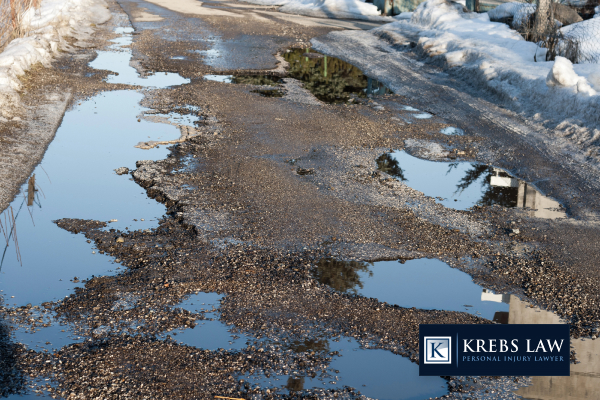
Fleet accidents can lead to serious injuries, major costs, and legal trouble. These crashes often involve company-owned vehicles, employees on the clock, and higher risks than standard car accidents. Understanding what causes them can help companies and drivers prevent future problems.
At Krebs Personal Injury Lawyers, we’ve seen the impact of these crashes up close. Whether it's poor maintenance or distracted driving, every detail matters. That’s why we work hard to uncover the root causes of each crash and help victims recover. We also hold companies accountable when they ignore fleet safety or cut corners on training.
Fleet accidents affect more than just the people involved. They also damage a company’s reputation, slow business operations, and increase insurance costs. Learning what causes these crashes -- and how to prevent them -- can save money and lives.
Driver behavior plays a major role in most fleet vehicle accidents. Some of the top driver-related causes that increase the risk of crashes in fleet operations are:
When drivers take their eyes or focus off the road, even for a second, the risk of a crash goes up. Using a phone, eating, adjusting the radio, or using GPS are all common distractions. These actions are dangerous in any vehicle, but even more so in large fleet vehicles.
Distractions slow reaction time. They make it harder to avoid traffic, follow road signs, or stop in time. In fleet operations, distractions can lead to vehicle accidents that harm drivers, passengers, and others on the road.
Good driver training and clear rules can reduce these risks. Companies should teach and enforce strong safe driving practices to keep their fleet drivers focused and alert.
Long hours behind the wheel can lead to driver fatigue. Tired drivers are slower to react and more likely to make mistakes. Drowsiness is just as dangerous as driving under the influence. Many fleet drivers work long shifts.
If they don’t get enough rest, their chances of causing a crash increase. In fact, fleet vehicle accidents often happen when a driver pushes beyond their limits. A strong fleet safety policy should include required rest breaks, limits on drive time, and rules that stop drivers from working while tired. Prioritizing rest reduces risk and keeps the road safer.
Speeding is a leading cause of vehicle accidents. When a fleet driver goes too fast, they have less time to react and more trouble stopping. Reckless driving includes tailgating, cutting off other cars, and ignoring traffic signs. These actions show poor driver behavior and increase danger to everyone nearby.
A good fleet safety program sets clear rules and tracks driver behavior. With monitoring tools, companies can spot risky habits and address them early. Enforcing safe driving practices helps prevent crashes and saves lives.
Driving under the influence of drugs or alcohol is illegal and dangerous, see AL Code § 32-5A-191 (2023). It affects judgment, slows reflexes, and increases the chance of a crash. When fleet drivers make this mistake, they put lives at risk and expose the company to lawsuits.
Impaired driving can also include some medications that cause drowsiness or slow thinking. Drivers must be aware of how medication affects them before getting behind the wheel. Companies need strict policies against impaired driving. Regular screenings and training are key safety measures to reduce fleet incidents caused by impairment.
Inexperienced drivers don’t always know how to handle large vehicles. Without proper driver training, they may struggle with turning, braking, or reacting to road hazards. Good training includes more than just how to drive.
It should cover fleet safety, road rules, cargo handling, and emergency response. Ongoing training also helps drivers stay sharp and aware of new risks. Proper driver training improves fleet operations and reduces accident risks. It also builds driver confidence and keeps everyone safer on the road.

Sometimes the cause of a crash has nothing to do with the driver. Problems with the vehicle itself can lead to fleet incidents.
Some of the most common vehicle-related causes are:
Skipping regular vehicle maintenance can lead to breakdowns or safety failures. Worn brakes, bad tires, or broken lights are common causes of vehicle accidents.
Every fleet vehicle should follow a strict maintenance schedule. This keeps vehicles in good shape and reduces unexpected problems on the road. Maintenance is a core part of fleet safety. Fleet managers who take it seriously help create a safer, more efficient fleet.
Even well-maintained vehicles can experience mechanical failures. Engine trouble, brake issues, and tire blowouts are all examples. These problems can cause the driver to lose control or be unable to stop in time.
To reduce this risk, fleet managers must invest in quality parts and equipment. Inspection systems should be in place to catch issues before they lead to crashes. Quick response and routine checks are key to preventing accidents linked to equipment failure.
Too much weight or uneven cargo loading can throw a vehicle off balance. This makes it harder to stop or turn and increases the chance of a rollover or loss of control. Cargo must be loaded within legal weight limits and secured properly.
When cargo shifts during a trip, it can lead to major fleet incidents. Training, supervision, and clear loading policies help reduce these risks. A safe load leads to safer roads.
Some causes of fleet vehicle accidents point back to the company. Poor policies, weak oversight, or pressure on drivers can lead to crashes. Here are some common company-level causes:
Hiring the wrong driver increases the risk of a crash. Employers must screen for driving history, training, and background issues before hiring. Skipping proper screening can lead to unqualified or unsafe drivers behind the wheel of fleet vehicles. This puts the public and the company at risk.
Strong hiring practices are the foundation of safe fleet operations. They help ensure that only qualified, trained, and responsible drivers are allowed on the road.
Some companies push drivers to meet tight deadlines. This pressure can lead to speeding, skipped breaks, or ignoring safe driving practices. Drivers may feel forced to take risks just to stay on schedule. When delivery demands come before safety, the chance of fleet incidents increases.
Rushed driving often leads to mistakes, vehicle damage, and injuries. Good fleet managers should balance deadlines with driver safety. A strong fleet safety culture values caution over speed.
Having safety rules isn’t enough. Companies must enforce them. If drivers break the rules without consequences, those rules lose power. Some crashes happen because safety guidelines were ignored, or never followed at all.
Without enforcement, even the best fleet safety program fails. Strong oversight, regular training, and clear discipline help reduce fleet vehicle accidents. Accountability saves lives and protects the business.
Lack of structure leads to problems. When fleet managers don’t track performance, monitor compliance, or respond to concerns, risk increases. Good fleet operations require systems.
Managers should keep detailed records, analyze crash data, and adjust training as needed. Effective oversight improves operational efficiency and helps prevent future fleet incidents. Investing in smart systems leads to fewer crashes and a safer workplace.

Sometimes outside forces play a role in crashes. These conditions are harder to control but still impact fleet safety. Here are the most common examples:
Bad roads can lead to vehicle accidents. Potholes, worn surfaces, and poor drainage increase the chance of losing control. Rain, ice, and snow make driving harder, especially for large fleet vehicles. These adverse weather conditions reduce traction and visibility.
Drivers must be trained to slow down and adjust to changes in the road. Planning routes and checking road conditions helps lower risk. Preparedness is a vital part of accident prevention.
Busy roads leave less room for error. Sudden stops, aggressive drivers, and tight lanes increase pressure on fleet drivers. Construction zones also cause confusion. New traffic patterns, closed lanes, and unexpected detours can lead to mistakes.
Large vehicles need more space and time to react. Reducing speed and using alternate routes are smart safety measures. Extra care in traffic saves lives and prevents vehicle accidents.
Not every crash is the fleet driver’s fault. Other drivers may cut in, brake suddenly, or ignore traffic laws. These moves force fleet vehicles into risky situations. Defensive driving is key. Even when others drive badly, a trained driver can often avoid a crash.
Tracking and monitoring driver behavior helps companies identify and coach high-risk habits. This protects both the driver and everyone else on the road.
What is fleet incident management, and why is it important?
Fleet incident management is how a company handles crashes, near-misses, and other road events. It includes reporting, tracking, and reviewing each vehicle involved. This helps fleet operators find patterns, improve training, and reduce future risks. Strong systems make a big difference in preventing repeat mistakes.
How can fleet operators lower the risk of accidents?
They can lower the risk of accidents by focusing on driver training, regular maintenance, and safety checks. Good scheduling, strong policies, and the use of technology also help. The more proactive the approach, the fewer crashes occur.
Are fleet drivers always at fault in accidents?
No. Many crashes happen due to other drivers, road hazards, or poor weather. Still, fleet operators must prove their drivers followed all safety standards. That’s why regular training and proper documentation are key.
Do companies need to follow certain safety standards for fleet vehicles?
Yes. There are both state and federal safety standards that must be followed. These include limits on drive time, rules about cargo weight, and vehicle inspection requirements. Breaking these rules can increase crash risks and lead to fines or lawsuits.
What should be done right after a fleet vehicle is involved in an accident?
The driver should call 911 if anyone is hurt, report the crash to dispatch, and collect details from others involved. Pictures, notes, and contact info are important. All info should then be passed to the fleet incident management team for review and next steps.

Fleet accidents can lead to serious injuries, high medical costs, and time away from work. If you or a loved one were hurt in a crash with a fleet vehicle, it’s important to get legal help right away.
Krebs Personal Injury Lawyers understands the challenges that come with these cases. From identifying who’s at fault to dealing with insurance companies, we handle every step for you. Our goal is to protect your rights and help you recover fair compensation.
We offer a free consultation to review your case and explain your legal options. You don’t pay anything unless we win for you. If a fleet vehicle caused your injuries, you shouldn’t have to face the financial burden alone.
Let us help you move forward. Call today to speak with an experienced fleet accident attorney serving Hale County.



"*" indicates required fields